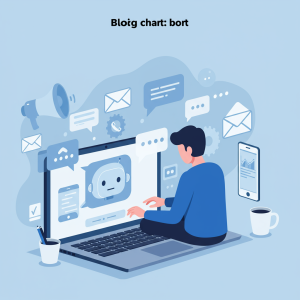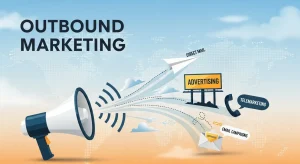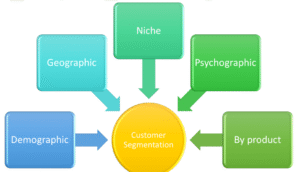The Psychology Behind Outbound Marketing: Why It Still Works
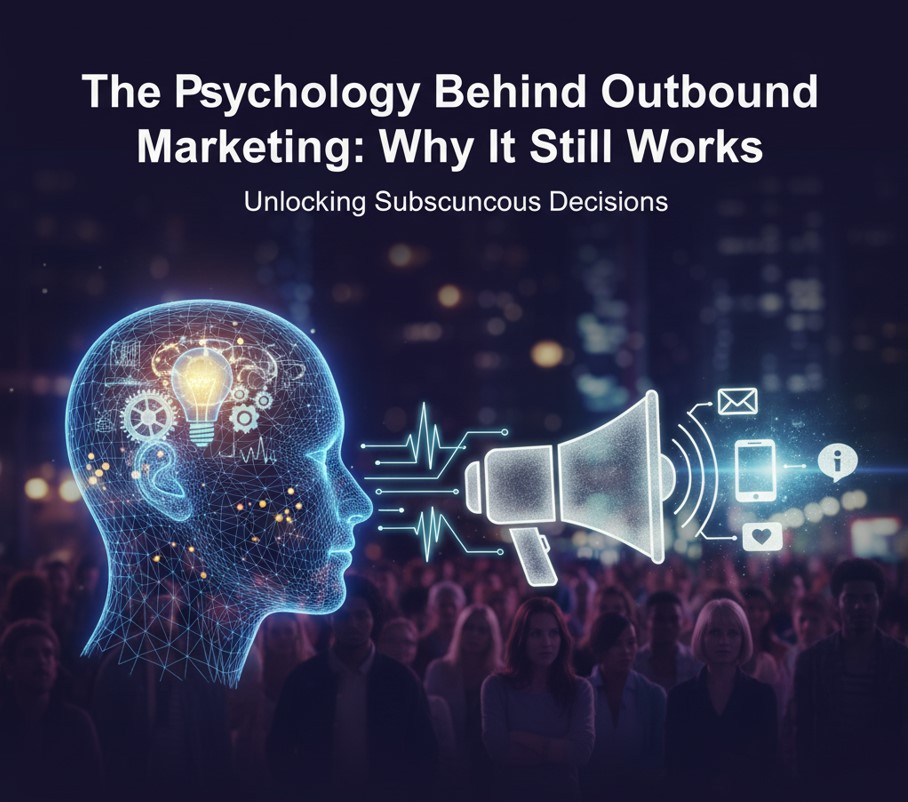
Despite predictions of its demise, outbound marketing continues to deliver results for businesses across industries. While inbound marketing has captured headlines and budgets over the past decade, the psychology underlying outbound tactics reveals why interruption-based strategies remain effective—and necessary—for many organizations.
Understanding the psychological principles that make outbound marketing work can help you craft more effective campaigns and make informed decisions about your marketing mix. From cognitive biases to behavioral triggers, the human mind responds to outbound marketing in predictable ways that smart marketers can leverage.
This post explores the psychological foundations of outbound marketing, examines why these tactics continue to generate leads and sales, and provides practical insights for implementing outbound strategies that resonate with your audience’s subconscious decision-making processes.
The Psychological Foundation of Outbound Marketing
Attention and Cognitive Processing
The human brain processes approximately 11 million bits of information per second but can only consciously handle about 40 bits. This massive filtering system means most marketing messages never reach conscious awareness. Outbound marketing works by breaking through this filter using psychological triggers that demand attention.
Interruption marketing succeeds because it exploits the brain’s orientation response—our automatic reaction to unexpected stimuli. When a cold call, email, or advertisement interrupts our routine, our brain momentarily shifts focus to assess the new information. This split-second window creates an opportunity for marketers to deliver their message before the filtering system reengages.
The psychology of pattern interruption explains why outbound tactics can be more memorable than inbound content. When someone actively seeks information through search or social media, they’re in a focused, goal-oriented state. Their brain expects to find relevant content. Outbound marketing disrupts this expectation, creating a more vivid memory trace through the element of surprise.
The Mere Exposure Effect
Repetition breeds familiarity, and familiarity breeds preference. The mere exposure effect, first documented by psychologist Robert Zajonc, demonstrates that people develop positive feelings toward stimuli they encounter repeatedly. This psychological principle underlies the effectiveness of outbound marketing campaigns that reach prospects multiple times across different channels.
Cold email sequences, retargeting ads, and follow-up calls work because each touchpoint increases familiarity with your brand. Even if prospects don’t respond immediately, repeated exposure builds subconscious preference that influences future buying decisions. The key is balancing frequency with relevance to avoid triggering negative associations.
Research shows that the mere exposure effect peaks after 10-20 exposures before declining due to habituation. This finding supports the common marketing wisdom of requiring multiple touchpoints to convert prospects, while also highlighting the importance of varying your approach to maintain effectiveness.
Why Outbound Marketing Triggers Action
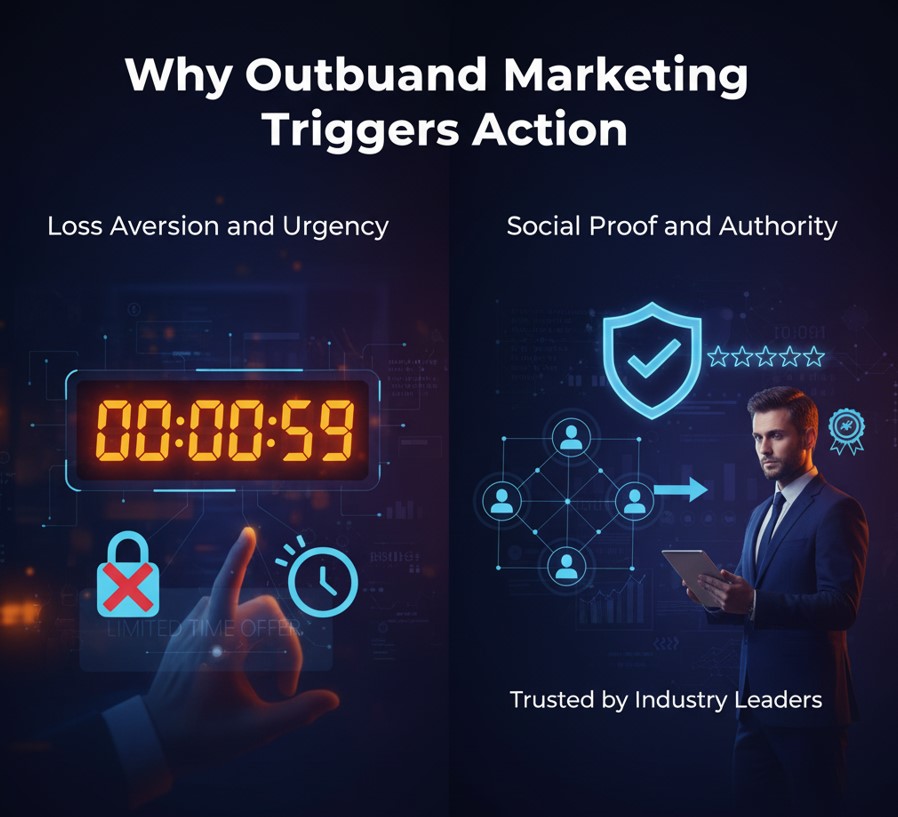
Loss Aversion and Urgency
Loss aversion—the psychological principle that people feel losses more acutely than equivalent gains—drives much of outbound marketing’s effectiveness. Limited-time offers, exclusive deals, and scarcity messaging tap into our fear of missing out, creating urgency that compels immediate action.
Outbound marketing excels at leveraging loss aversion because it can deliver time-sensitive messages directly to prospects. Unlike inbound content that prospects discover on their own timeline, outbound tactics can create artificial urgency that pushes prospects toward faster decisions.
Email campaigns with countdown timers, cold calls mentioning limited availability, and direct mail featuring expiration dates all exploit loss aversion to accelerate the buying process. The psychological discomfort of potentially missing out often outweighs rational evaluation of whether the offer truly benefits the prospect.
Social Proof and Authority
Outbound marketing provides unique opportunities to establish authority and demonstrate social proof through direct communication. Cold callers can reference mutual connections, email campaigns can highlight customer testimonials, and direct mail can showcase awards and certifications in ways that feel more personal than website content.
The psychology of authority suggests that people are more likely to comply with requests from perceived experts or authority figures. Outbound marketing allows sales teams to establish credibility through professional presentation, industry knowledge, and confident communication style.
Name-dropping existing clients during cold calls leverages social proof by suggesting that similar companies trust your solution. This psychological trigger is particularly powerful in B2B contexts where prospects want to minimize risk by following the lead of industry peers.
The Reciprocity Principle in Outbound Marketing
Creating Psychological Debt
Reciprocity—the psychological urge to return favors—forms the foundation of many successful outbound campaigns. When marketers provide value before asking for anything in return, they create psychological debt that prospects feel compelled to repay through engagement or purchases.
Outbound marketing can trigger reciprocity through unexpected value delivery. Sending prospects useful industry reports, offering free consultations, or providing personalized insights creates a sense of obligation that increases response rates. The key is ensuring the initial value feels genuine rather than manipulative.
Cold emails that begin with helpful resources or insights perform better than purely promotional messages because they establish reciprocity before making requests. Prospects who benefit from your free value are psychologically primed to reciprocate through meeting acceptance, referrals, or eventual purchases.
The Commitment and Consistency Bias
Once people make small commitments, they’re psychologically motivated to remain consistent with that initial decision. Outbound marketing can leverage this bias by securing minor commitments that lead to larger ones over time.
Cold callers who get prospects to agree to simple requests—like confirming their biggest business challenge or accepting a brief follow-up email—increase the likelihood of securing meetings. Each small “yes” creates psychological momentum toward larger commitments.
Email campaigns that use progressive commitment strategies, starting with content downloads before requesting demos or consultations, tap into the consistency bias. Prospects who engage with early touchpoints feel internal pressure to maintain consistent behavior by engaging with subsequent offers.
Cognitive Biases That Make Outbound Effective
The Availability Heuristic
People judge the likelihood of events based on how easily they can recall similar examples. Outbound marketing works because it makes your solution more mentally available when prospects face relevant problems.
Cold calls and emails that address specific business challenges increase the mental availability of your solution category. When prospects later encounter those challenges, they’re more likely to remember your conversation and reach out for help.
This psychological principle explains why outbound marketing often generates delayed responses. Prospects who initially show no interest may contact you weeks or months later when they face the problems you discussed. The outbound touchpoint made your solution mentally available for future reference.
Anchoring Bias
The first piece of information people receive about a topic serves as an anchor that influences all subsequent judgments. Outbound marketing provides opportunities to establish favorable anchors before competitors can influence prospect perceptions.
Cold callers who lead with impressive statistics about their results create high-performance anchors that make other solutions seem inadequate by comparison. Email campaigns that highlight significant cost savings or efficiency gains anchor prospects’ expectations around substantial value.
The timing advantage of outbound marketing amplifies anchoring effects. By reaching prospects before they begin active research, outbound campaigns can establish anchors that persist throughout the buying process, even when prospects later engage with inbound content.
Building Trust Through Direct Communication
Parasocial Relationships
Repeated outbound touchpoints can create one-sided emotional connections known as parasocial relationships. Prospects begin to feel they know your sales representatives personally, even though the relationship remains primarily one-directional.
These psychological connections increase trust and receptivity to sales messages. Prospects who develop parasocial relationships with outbound marketers are more likely to take meetings, respond to emails, and ultimately make purchases.
Video emails, personalized voicemails, and consistent communication from the same representative strengthen parasocial bonds. The key is maintaining an authentic personality while delivering consistent value across touchpoints.
The Halo Effect
Positive impressions in one area influence perceptions across unrelated attributes. Professional outbound marketing campaigns create halo effects that enhance overall brand perception and product evaluation.
Well-crafted cold emails suggest that your company is detail-oriented and professional. Articulate cold calls imply that your product is sophisticated and well-designed. These psychological associations occur automatically, even when prospects recognize they’re not logically connected.
The halo effect explains why outbound marketing quality correlates with perceived product quality. Prospects unconsciously assume that companies with impressive outbound campaigns offer superior solutions, creating competitive advantages that extend beyond marketing into sales and retention.
The Neuroscience of Interruption Marketing
Dopamine and Surprise
Unexpected outbound messages can trigger dopamine release in prospect brains, creating positive associations with your brand. The neurotransmitter dopamine drives pleasure and motivation, making prospects more receptive to sales messages that arrive surprisingly.
Cold calls that begin with unexpected good news, emails that deliver unplanned value, and direct mail that exceeds expectations can all trigger beneficial dopamine responses. The key is ensuring the surprise feels positive rather than intrusive.
Research shows that intermittent reinforcement—unpredictable rewards—creates stronger behavioral patterns than consistent reinforcement. Outbound campaigns that vary their value delivery create more powerful psychological associations than those that provide identical touchpoints repeatedly.
Mirror Neurons and Emotional Contagion
Mirror neurons fire both when we perform actions and when we observe others performing similar actions. Outbound marketing can activate mirror neurons by describing how other customers successfully use your solution, creating vicarious experiences that feel personally relevant.
Case studies shared during cold calls, customer success stories in emails, and testimonials in direct mail all leverage mirror neuron activation. Prospects unconsciously imagine themselves achieving similar results, making the emotional benefits feel more tangible and achievable.
Emotional contagion—the tendency to unconsciously mimic others’ emotions—explains why enthusiastic outbound marketing tends to generate more positive responses. Sales representatives who express genuine excitement about their solutions create matching emotional states in prospects.
Making Outbound Marketing Work for Your Business
Understanding the psychology behind outbound marketing success enables more strategic campaign development. Rather than relying solely on volume and persistence, you can craft messages that align with how prospects actually make decisions.
Start by identifying which psychological principles most strongly influence your target audience. B2B prospects often respond to authority and social proof, while consumer audiences might be more motivated by scarcity and reciprocity. Test different psychological triggers to determine what resonates with your specific market.
The most effective outbound campaigns combine multiple psychological principles. Cold emails that establish authority, provide social proof, and create reciprocity through value delivery are more likely to generate responses than messages relying on single triggers.
Remember that psychological principles work best when applied authentically. Prospects can sense manipulation, which triggers psychological reactance—the tendency to resist perceived attempts to restrict freedom. Focus on genuinely helping prospects rather than simply trying to influence their behavior.
The future of outbound marketing lies in psychological sophistication rather than technological advancement alone. While automation and data analytics improve targeting and efficiency, understanding human psychology enables the authentic connections that drive lasting business relationships.
By respecting the psychological realities of how people process information, make decisions, and form relationships, outbound marketing can complement inbound strategies to create comprehensive marketing systems that serve both business objectives and customer needs.
Learn more about: Outbound Marketing for Product Promotion: Old-School Tactics That Still Work


